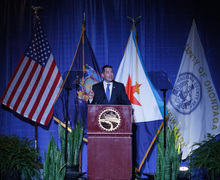King: Songwriters have unjust deals with music streaming sites, labels
Two behemoths in the music industry are investing in streaming: Apple and Jay Z. Apple bought headphone maker Beats by Dre, which already had its own streaming service in May of last year, and now intends to relaunch the site before this summer. News broke in January that Jay Z is in the process of buying Scandinavian music streaming service Aspiro. The mogul and the company are both about to enter a battle over consumer ears with Spotify, Pandora and others — a battle that has been raging for over a decade.
As more people enter the growing — and growingly controversial — industry, more people want a bigger slice of the pie. Now, many artists are crying out that they aren’t making the money they’d like to off of these services. While it might be true that performers like Nicki Minaj aren’t exactly raking it in directly from Spotify listeners, it’s the songwriters who are really suffering.
I know what you’re thinking. Taylor Swift just pulled all of her music off Spotify. What’s the point anymore? We all know the stats. For every 500,000 streams on Spotify, an artist makes three nickels and some pocket lint. That’s — allegedly — why the noble Swift pulled her music in the first place, to take a stance against steaming services. Adorable.
She joins other artists who have periodically refused to participate in online music services, ranging from AC/DC, The Beatles and Led Zeppelin — bands who are so well-known already, they wouldn’t benefit from these services anyway — to less well known groups like Atoms for Peace, whose fan base stands to completely explode. The indie band also shares sentiments similar to Swift’s. It’s all about standing up for other artists’ rights.
Streaming services benefit performers with fame and name recognition, and that can be very present in their real paycheck. Unfortunately, songwriters don’t experience the same effect. Songwriter rates are determined by law. So across the board, their rates are standard. However, part of the share they receive is siphoned to a middleman like performance rights agencies and labels.
Performance rights agencies are transparent with their dealings, they give artists a seat at the table. True to their name, they protect the artist’s rights to his music. Labels, on the other hand, don’t do any of that. What needs to happen is these services, labels and other middlemen need to compensate their artists, especially songwriters, fairly.
As we fly into this dark and stormy iCloud, we may experience some turbulence. The most important thing middlemen can do for songwriters moving forward is be transparent about their dealings. This gives artists the negotiating power they need to control their music. Hopefully Jay Z, being an artist himself, will make that a priority as he builds Aspiro.
Swift pulling her music was a power move. She wanted to assert more control over music, a financially sound decision, but did so with a misplaced sense of piousness. That being said, Taylor, please put your music back on Spotify. Your boy just upgraded to premium.
If you are really worried about an artist you love — an artist unlike Taylor Swift, who will never cease to make money — then go to that artist’s concert. Buy their album, buy their T-shirt. But don’t mourn for them because you think Spotify has swindled them. If anything, it will only help them.
In a previous version of this column, the findings of the 2012 Future of Music Coalition survey were mischaracterized. The Daily Orange regrets this error.
Eric King is a sophomore magazine journalism major. His column appears weekly. He can be reached at edking@syr.edu and followed on Twitter @erickingdavid.
Published on February 17, 2015 at 1:03 am





